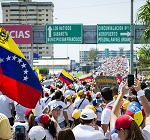The change of government in the Ukraine has triggered off an avalanche of diplomatic and non-diplomatic actions, with a president in exile, the protestors in power, a secession coming up from Crimea, concerns in neighbouring Russia and the United States. But the events surrounding the Ukraine’s turmoil have had an impact as far away as Latin America – more specifically in Venezuela, where a post-Chavez leadership is gradually losing popularity. Inevitably, as is the way of revolutions and protests, a copycat movement has arisen in Caracas.
Q. In what way did the Ukrainian regime change inspire the anti-government Venezuelan protestors?
The radicals in the opposition parties in Venezuela, including one of their leaders, the Harvard-educated Leopoldo Lopez, were inspired by the victory of the Ukrainian protestors in overthrowing the democratically-elected President. In April 2002, the Venezuelan opposition almost succeeded in overthrowing President Chavez through massive protests. Chavez was removed from power by a military coup, and a businessman, Pedro Carmona, with the support of the military, became the interim president and Chavez was sent to an island prison. But the coupsters fought among themselves for the spoils of power, leading to a counter coup in which Chavez was brought back to power in two days.
In the current situation, the protestors of the last one month have been demanding government action against the rampant crime and violence, severe shortage of essential goods, power shortage and high inflation; but their hidden agenda behind the protests is regime change.
Q. Is that possible in Venezuela now, like it has been in the Ukraine?
No. While the middle class, business and opposition parties are participating in the protests, the poor who form 40% of the population, are still supporters of the leftist Maduro government. They have had a better deal from the leftist government and they fear that if the opposition comes to power, there will not be such a level of pro-poor support.
From the government side, there are armed Chavista militias who can terrorise the peaceful middle class protestors, if the situation demands. The government of Nicolas Maduro controls all the levers of power including the military, police, judiciary, parliament and media. There is no hope for any regime change in Venezuela at the moment.
Q. Can Maduro survive the protests and complete his term?
While President Maduro can outlive the ongoing protests, he has powerful rivals within his government and the party who could exploit the protests to replace him. Diosdado Cabello, the president of the Parliament and a former military comrade of Hugo Chavez, is the one leader who could unseat Maduro.
Q. Can the U.S. play any role in Venezuela as it has done in the Ukraine?
The U.S. is said to have played a role in the coup against Chavez in 2002. Having learnt the lesson from that unsuccessful experience, the Americans are more careful this time. Obama and his administration have restricted themselves to condemning Maduros’ government for the violent repression of the protestors and their sympathizers. Some right-wing legislators from the U.S. have called for sanctions and stronger measures.
But Washington’s attention is more focused on the big-stakes issue of Ukraine because of which it has had a lesser focus on Venezuela. This week, Vice President Biden cut short his Latin America tour to meet the Ukrainian interim Prime Minister in Washington DC.
Washington is disincentivized from Latin American interference for other reasons too. Last week, the US failed to get condemnation of the Venezuelan government in the declaration issued by the Washington-based Organisation of American States (OAS) which called upon the Venezuelan government to resolve the crisis through peaceful talks with the protestors. In fact, the U.S., along with Canada and Panama, was isolated in the approval of the Declaration which was supported by all the other Latin American and Caribbean members. Maduro’s government is gloating over this as a diplomatic victory.
Q. Can the Latin American governments play a role to diffuse the crisis in Venezuela?
Yes. That’s what the Venezuelan government wants. It has appealed to UNASUR – the South American Union of 12 countries- to help them resolve this crisis. In the past, UNASUR has successfully mediated during anti-government agitations against the leftist regimes in Bolivia and Ecuador and defused the crisis and enabled the elected presidents to continue. The UNASUR meeting is expected to take place on 12 March in Santiago, Chile where the 12 South American Presidents are assembling to witness the assumption of power in Santiago, by Michelle Bachelet, the new Chilean President. UNASUR could consider sending a delegation of foreign ministers to mediate in Venezuela to mediate in Venezuela to bring about a settlement between the government and the opposition
Q. What of Brazil, the regional power?
Brazil has already expressed solidarity with the fellow leftist government of Maduro. There’s a history here, but also economic interest. Brazil has much at stake in Venezuela which has given many lucrative infrastructure and export contracts to Brazilian companies. Consequently, the Brazilians would not like the democratically-elected Maduro government to be toppled by protestors. They know that if the protestors succeed there, it might spread to other leftist –ruled countries such as Argentina, Bolivia and Ecuador, among others. During the protests against Chavez in 2002, Brazil extended crucial support to the Venezuelan leader and helped him to survive.
R. Viswanathan is the former Indian Ambassador to Argentina, Uruguay and Paraguay (2007-2012). He was earlier the Ambassador to Venezuela and served as Consul General of India in Sao Paulo, Brazil.
This interview was exclusively conducted for Gateway House: Indian Council on Global Relations. You can read more exclusive content here.
For interview requests with the author, or for permission to republish, please contact outreach@gatewayhouse.in.
© Copyright 2014 Gateway House: Indian Council on Global Relations. All rights reserved. Any unauthorized copying or reproduction is strictly prohibited.


